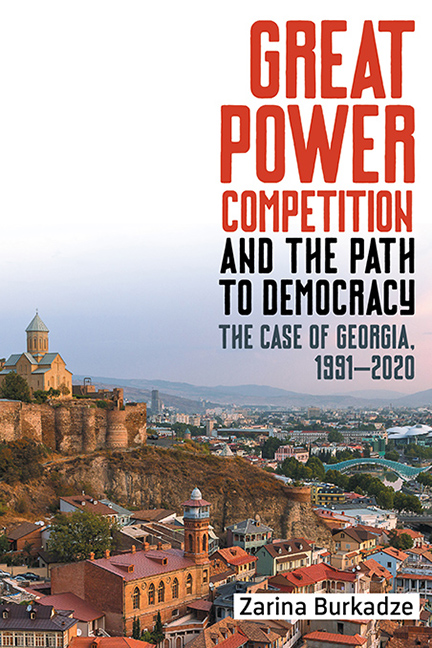Book contents
- Frontmatter
- Contents
- Preface
- List of Acronyms and Abbreviations
- Introduction: The Puzzle of Georgian Democratization
- 1 Autocracy and Democracy in Georgia: What Made the Difference?
- 2 Democratization without Great Power Competition, 1991–1993
- 3 Pluralizing Geopolitical Space, 1993–2003
- 4 The Dictatorship of Democrats, 2003–2012
- 5 Democratic Arrival? 2012–2020
- 6 Democracies In-Between
- Conclusion
- Appendix: List of Interviews
- Bibliography
- Index
3 - Pluralizing Geopolitical Space, 1993–2003
Published online by Cambridge University Press: 16 July 2022
- Frontmatter
- Contents
- Preface
- List of Acronyms and Abbreviations
- Introduction: The Puzzle of Georgian Democratization
- 1 Autocracy and Democracy in Georgia: What Made the Difference?
- 2 Democratization without Great Power Competition, 1991–1993
- 3 Pluralizing Geopolitical Space, 1993–2003
- 4 The Dictatorship of Democrats, 2003–2012
- 5 Democratic Arrival? 2012–2020
- 6 Democracies In-Between
- Conclusion
- Appendix: List of Interviews
- Bibliography
- Index
Summary
During the presidency of Eduard Shevardnadze, the processes of political stabilization and democratization began. Shevardnadze's unsuccessful efforts with Russia forced him to rethink his foreign policy priorities. Through the inclusion of the West, Shevardnadze contained Russia and prolonged his tenure in power. The external political competitors affected the institutional formation and helped their proxies to survive the domestic political competition. But Georgian society continued to be frustrated by dysfunctional political elites as their corrupt practices became more rooted in the mechanisms of the state, and they used dependence on aid as a prevalent mode of relations with other segments of the polity and the society. As the conflicts in the South Ossetia and Abkhazia were localized and froze, there was in-group fractionalization among the political elites. The combination of these external and domestic factors defined the democratizing processes of this period.
The Return of Eduard Shevardnadze
The processes of state-building in Georgia continued while post-Soviet authoritarian institutions remained in place. This added to the perilous nature of the democratic transition, as Shevardnadze struggled to reconcile divided political and social groups. However, he reduced the most polarizing effects by removing militaries and radical groups from the political leadership. Shevardnadze rebuilt the country after the civil war and separatists’ conflicts, and the political processes moved to parliament. He initiated reforms to transform state institutions, and the police replaced paramilitary groupings in the streets.
After the elections, Shevardnadze adopted the Law on the State Powers, which was a substitute for the constitution. The parliament elected its chairperson as the head of state. The chairperson of parliament occupied the leading position of the legislative and executive branches at the same time and was entitled to appoint or dismiss judges, the prosecutor general, and ministers (Article 17), and this caused a power fusion. External democratizers signaled to Shevardnadze that the Law on the State Powers was undemocratic and failed to act as a check and balance to the legislatures, executives, and judicial system. Shevardnadze had made the decision to develop greater ties to the West as a means of overcoming uncertainties of the Russian dominance in Georgia and to gain external legitimacy, but in doing so, he invited new pressures on this process.
- Type
- Chapter
- Information
- Great Power Competition and the Path to DemocracyThe Case of Georgia, 1991-2020, pp. 67 - 88Publisher: Boydell & BrewerPrint publication year: 2022



